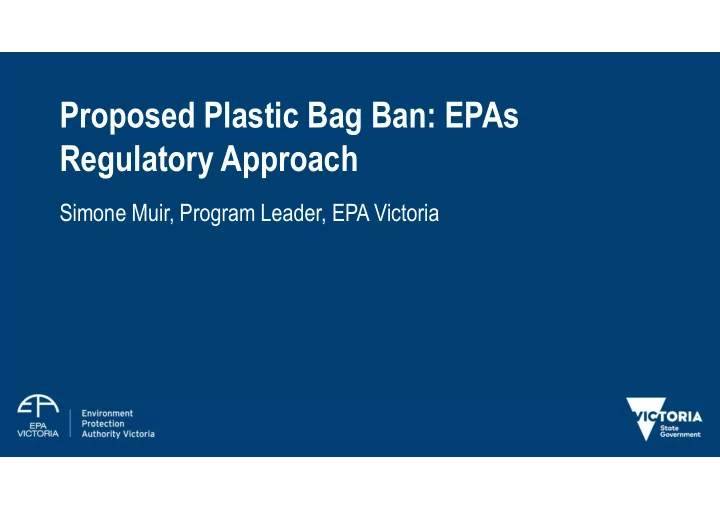

Proposed Plastic Bag Ban: EPAs Regulatory Approach Simone Muir, Program Leader, EPA Victoria
Background – the Bill Environment Protection Amendment Bill 2019 currently before Parliament. It looks • to Amend the Environment Protection Act 1970 and the Environment Protection Amendment Act 2018. If passed, plastic bag ban will come into effect from November 2019 • • It is the government’s intention that the plastic bag ban will continue from July 2020 under Regulations under the new EP Act • If it passes it would see the introduction of a ban on retailers providing lightweight, singlet-style, plastic bags, free or to purchase, to customers to carry their goods in. • It will not apply to all bags. Plastic bags without handles of the kind used to carry loose fruit and vegetables, bin liners, and thicker 'department store' bags will not be banned. • The Bill places duties on retailers, wholesalers and manufacturers.
What bags are included in the Bill: Proposed banned bags: A bag, other than an exempt plastic bag • – With handles and – That comprises, either wholly or partly, plastic, whether or not that plastic is biodegradable, degradable or compostable; and – that has a thickness of 35 micrometres or less at any part of the bag ; or a prescribed banned plastic bag – Proposed exempt bags: • means a bag that comprises, either wholly or partly, plastic that— is a barrier bag; or – is an integral part of the packaging in which goods are sealed or provided for – sale; or – – is a prescribed exempt plastic bag; • A barrier bag: – comprises, either wholly or partly, plastic; and does not have handles; and – is used to carry unpackaged perishable food; –
Proposed offences Retailer must not provide banned plastic bags A retailer must not sell or provide a banned plastic bag to a person to carry or transport goods sold or • provided by the retailer from the retail premises Under the Bill as presented, penalties will apply to retailers who sell or provide a banned plastic bag to a person to carry or transport goods sold or provided by the retailer from the retail premises. The maximum court penalty for individuals $9,913.20 and for a Body Corporate $49,566 . Provision of false or misleading information relating to banned plastic bags • A retailer or wholesaler, or a manufacturer of plastic bags, must not, whether by act or omission , provide to ant other person information the retailer, wholesaler or manufacturer knows, or should reasonably know, is false or misleading about: The composition of a banned plastic bag; or • • Whether or not a bag is banned plastic; or • Whether or not a bag is an exempt plastic bag. Under the Bill as presented, penalties will apply to retailers, wholesalers and manufacturers who know or should reasonably know that the information they are providing is false or misleading information about the composition of a banned plastic bag; or whether a bag is banned. The maximum court penalty for individuals $9,913.20 and for a Body Corporate $49,566
EPA’s Approach If passed, EPA will take a regulatory approach to the ban. EPAs regulatory approach involves the following steps: Inform and educate: DELWP have been providing information to • the sector on the proposed ban. EPA will engage with the sector to raise awareness of requirements and EPAs role. Set standards: the legislation • • Support to comply: where EPAs initial focus will be. This includes information and engagement with industry, including in the lead up and during the early stages of the ban. EPA will work with industry to ensure it complies with its legislative duty • Monitor compliance and enforce the law: EPA will take a risk based approach and will undertake any compliance activity in line with our Compliance and Enforcement Policy.
If the Bill passes… EPA will: • Focus on supporting Industry to comply, including by working with Industry to understand what support is needed • Provide web based content and FAQs to help support the sector (e.g. who is a retailer, measurement of bags, what bag types are exempt etc) • Communicate and engage with Industry. Compliance activity will be risk based, and in accordance with our • Compliance and Enforcement Policy. EPA expects Industry will: Ensure you understand and are complying with your obligations. It is • your responsibility to understand and manage your duty and risks.
Recommend
More recommend